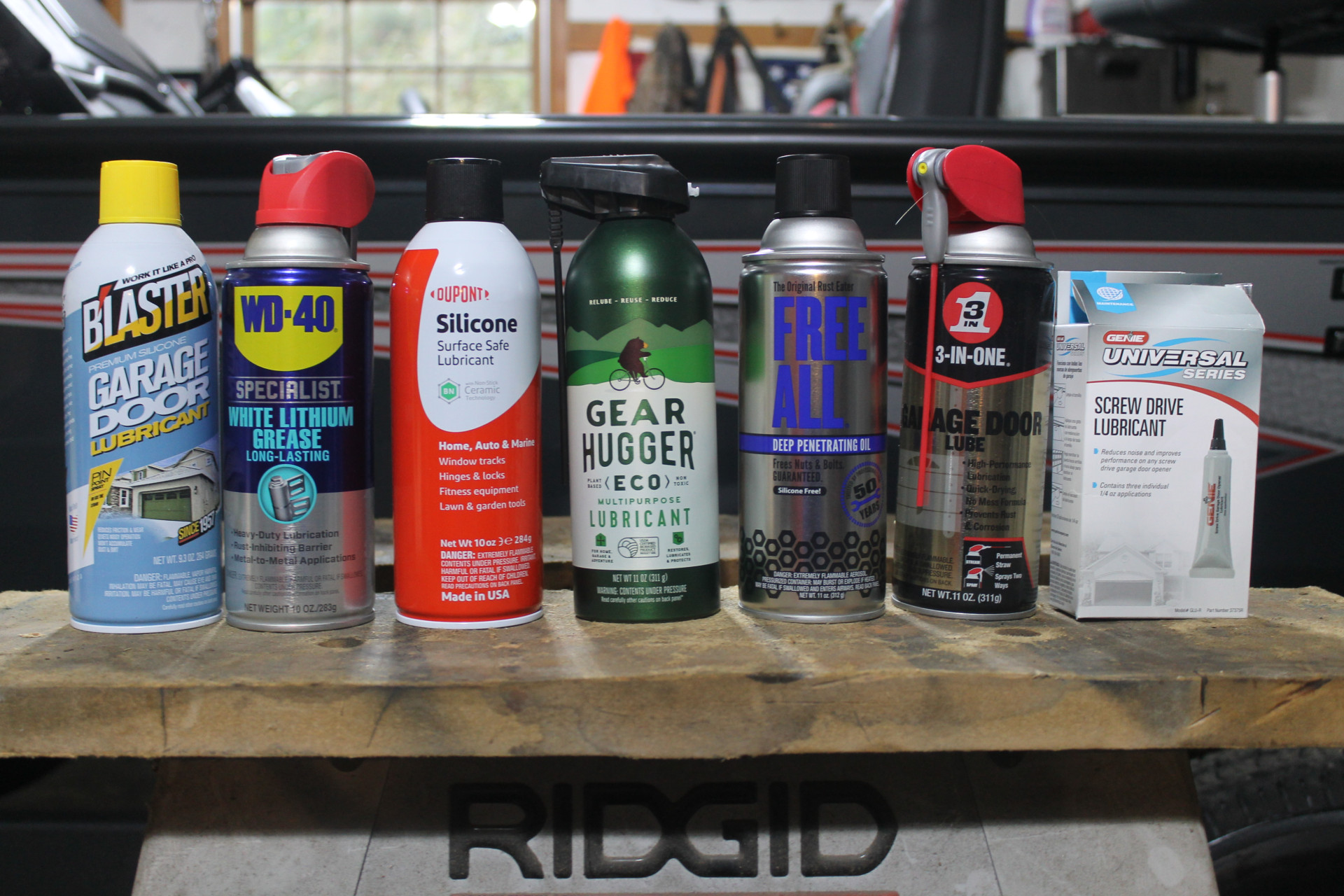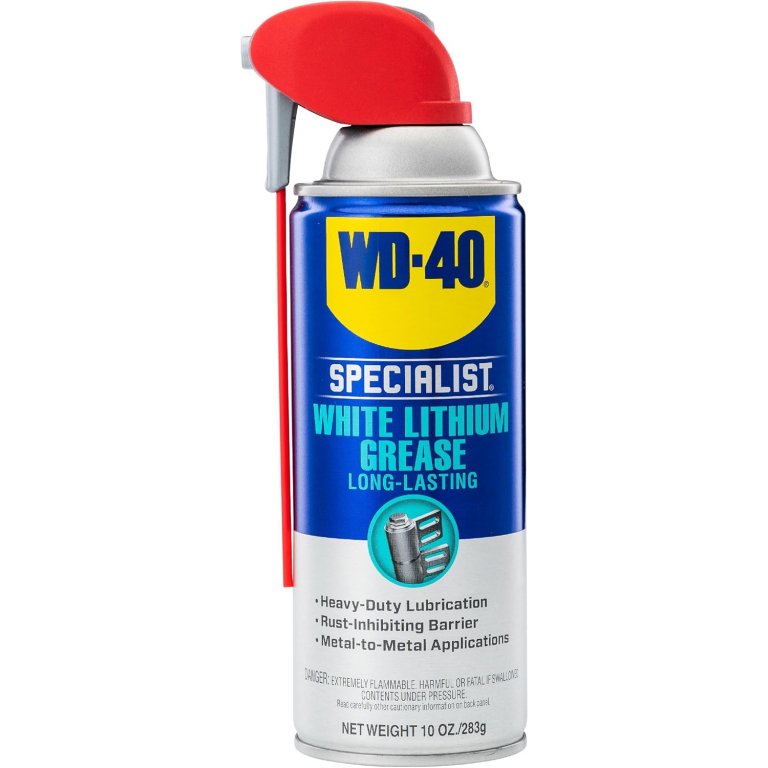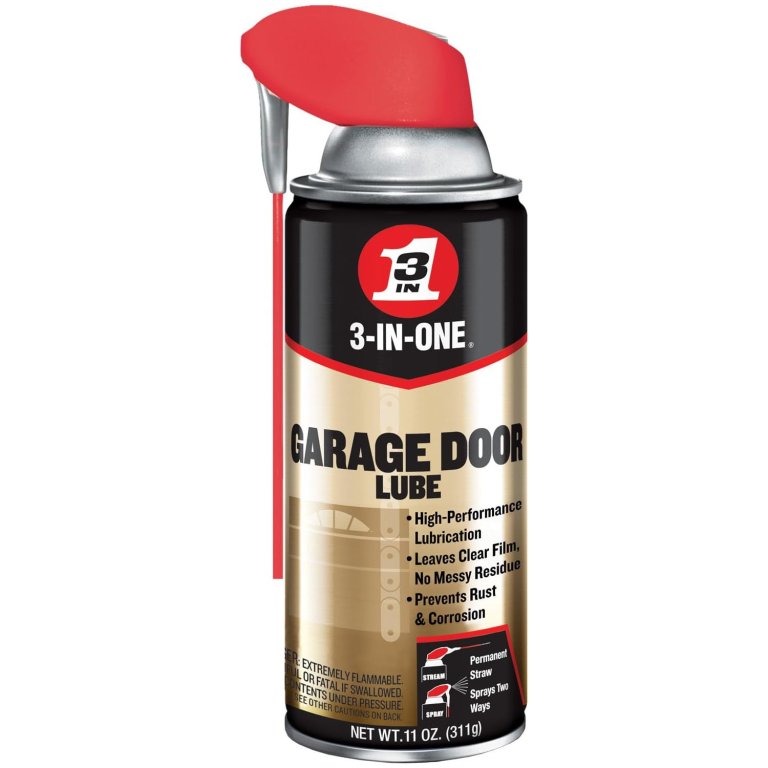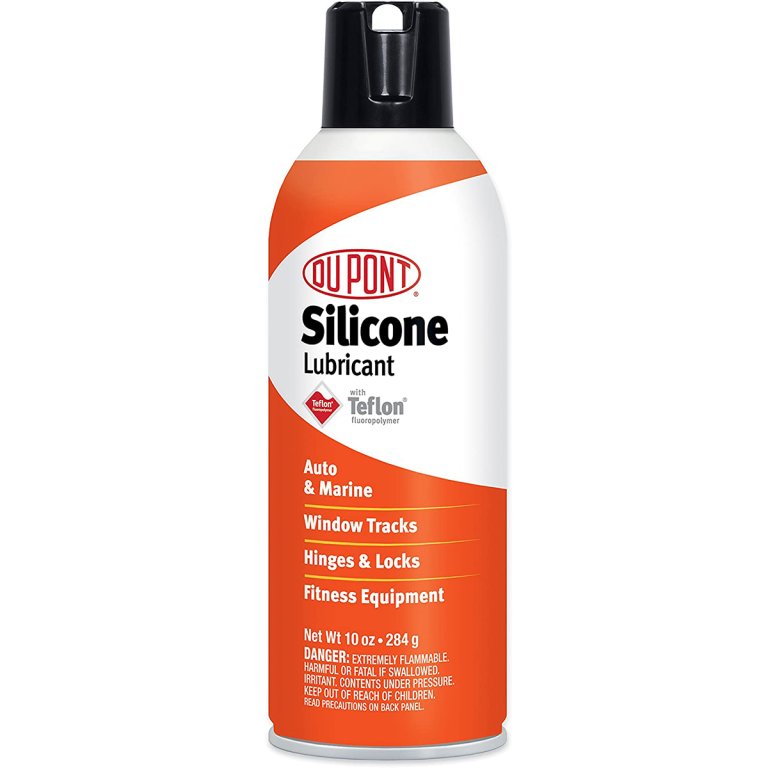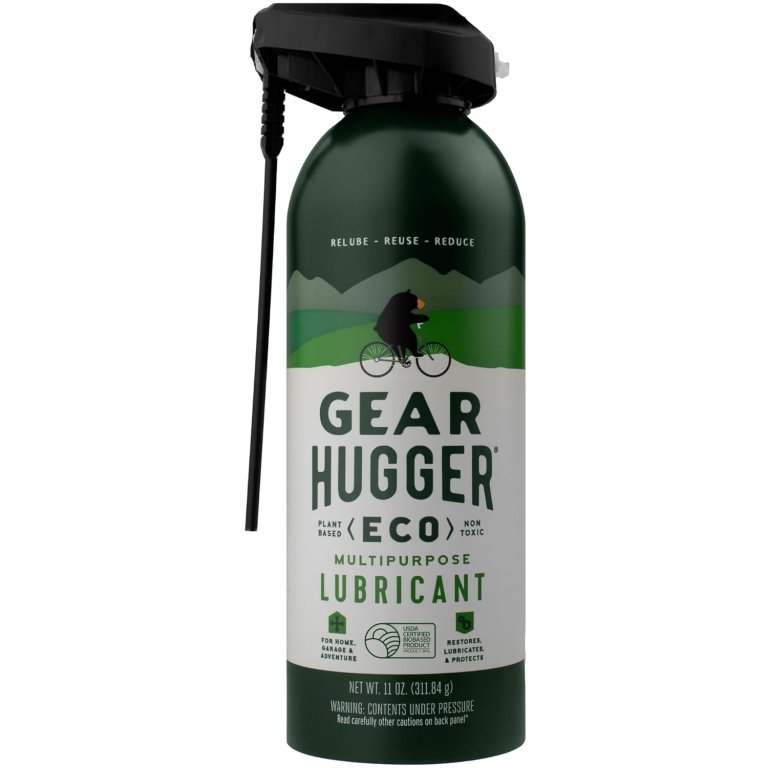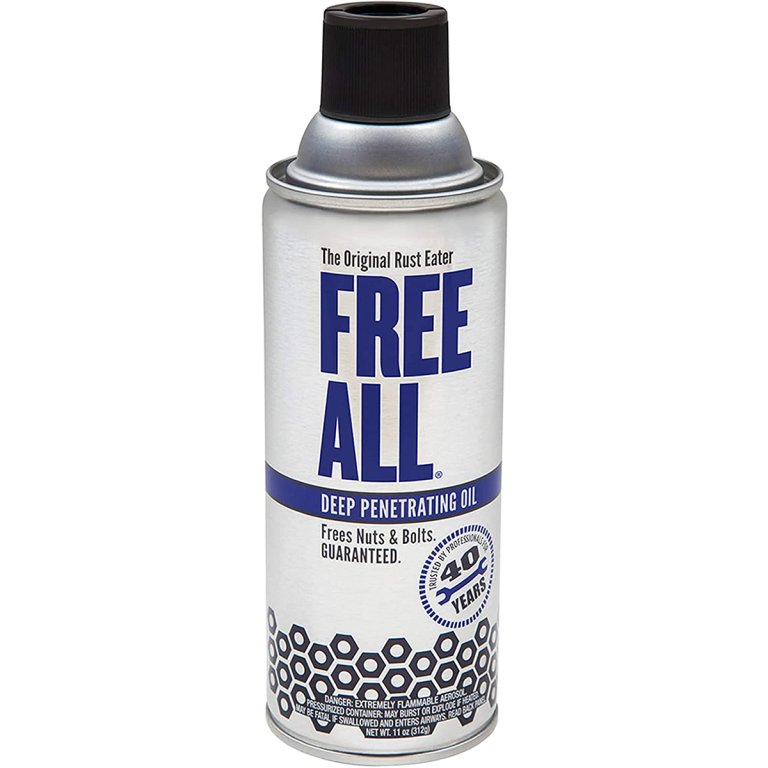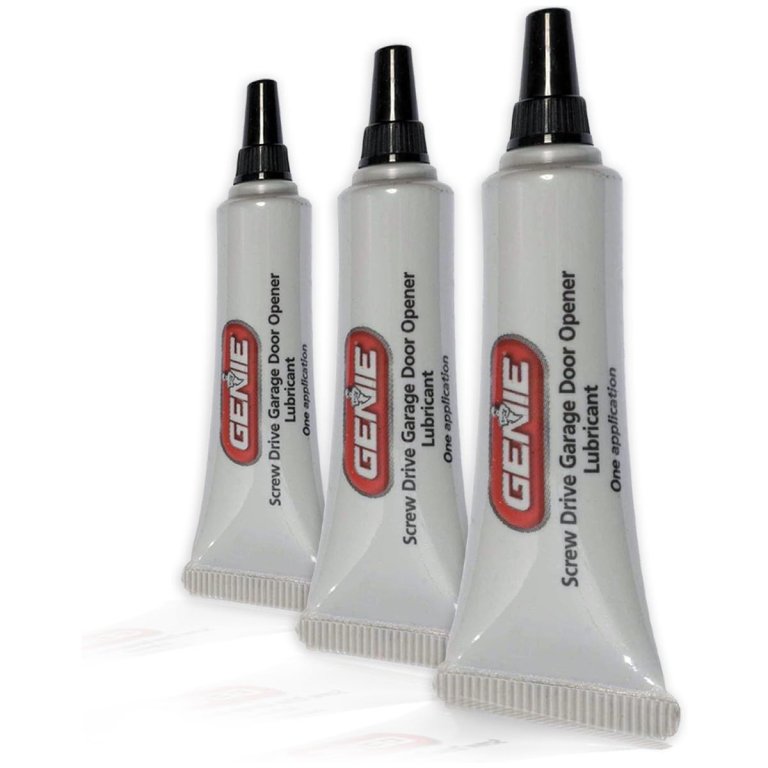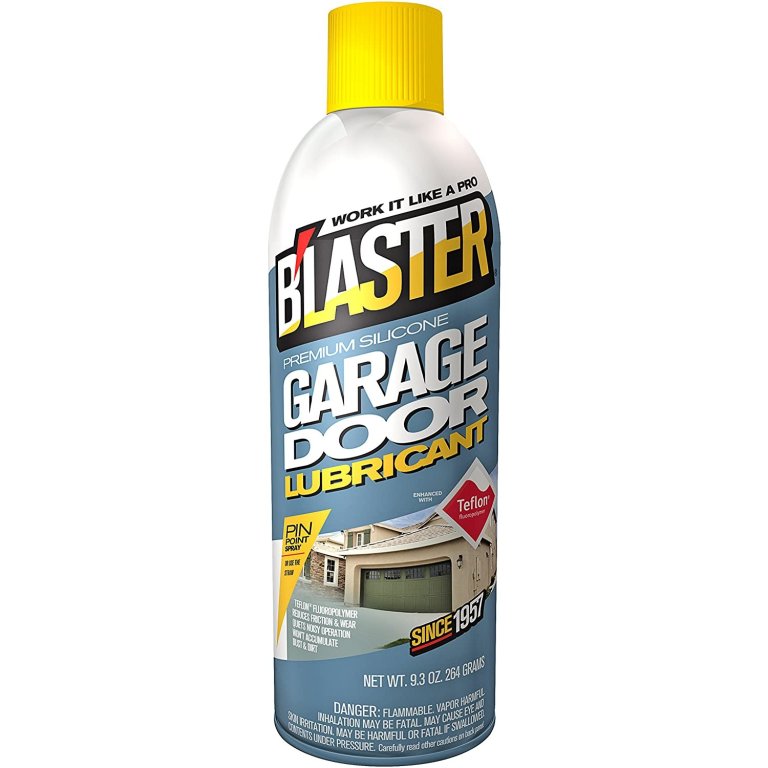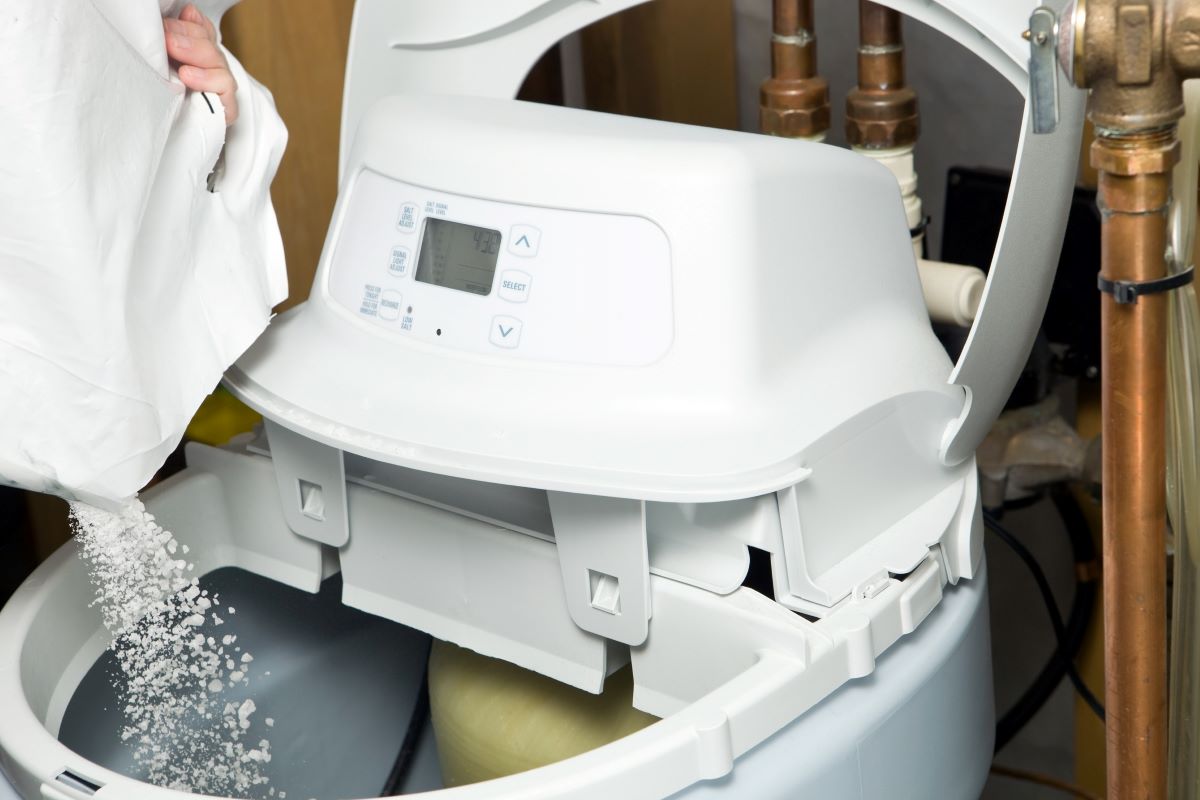We may earn revenue from the products available on this page and participate in affiliate programs. Learn More ›
If your garage door rumbles and chatters, there’s a good chance it needs an application of garage door lubricant. Over time, moisture and natural oxidation can cause rust and wear, which can result in a garage door that sounds more like gravel in a coffee can than a well-oiled machine as it opens. A high-quality garage door lubricant can help ward off the effects of moisture, reduce oxidation, and protect metal parts, such as hinges, rails, and rollers, from friction, making these lubricants a critical aspect of garage maintenance. To pinpoint the best products for reducing friction, stopping squeaks, and battling rust, we spent a month testing seven popular options.
Our favorite is the WD-40 Specialist White Lithium Grease Spray. It quiets noisy garage doors and is easy to apply with its two-way nozzle. But a few other options stood out, too. Read on for key insights into how some of the best garage door lubricants performed during testing, as well as information on what to consider before making a purchase.
- BEST OVERALL: WD-40 Specialist White Lithium Grease Spray
↓ Jump to Review - BEST BANG FOR THE BUCK: 3-In-One Professional Garage Door Lubricant
↓ Jump to Review - BEST SILICONE SPRAY: DuPont Teflon Silicone Lubricant
↓ Jump to Review - BEST ECO-FRIENDLY: Gear Hugger Eco-Friendly Multipurpose Lubricant
↓ Jump to Review - BEST FOR RUSTY DOORS: Free All Deep Penetrating Oil
↓ Jump to Review - BEST FOR SCREW DRIVE: Genie Screw Drive Garage Door Opener Lubricant
↓ Jump to Review - ALSO CONSIDER: Blaster Premium Silicone Garage Door Lubricant
↓ Jump to Review
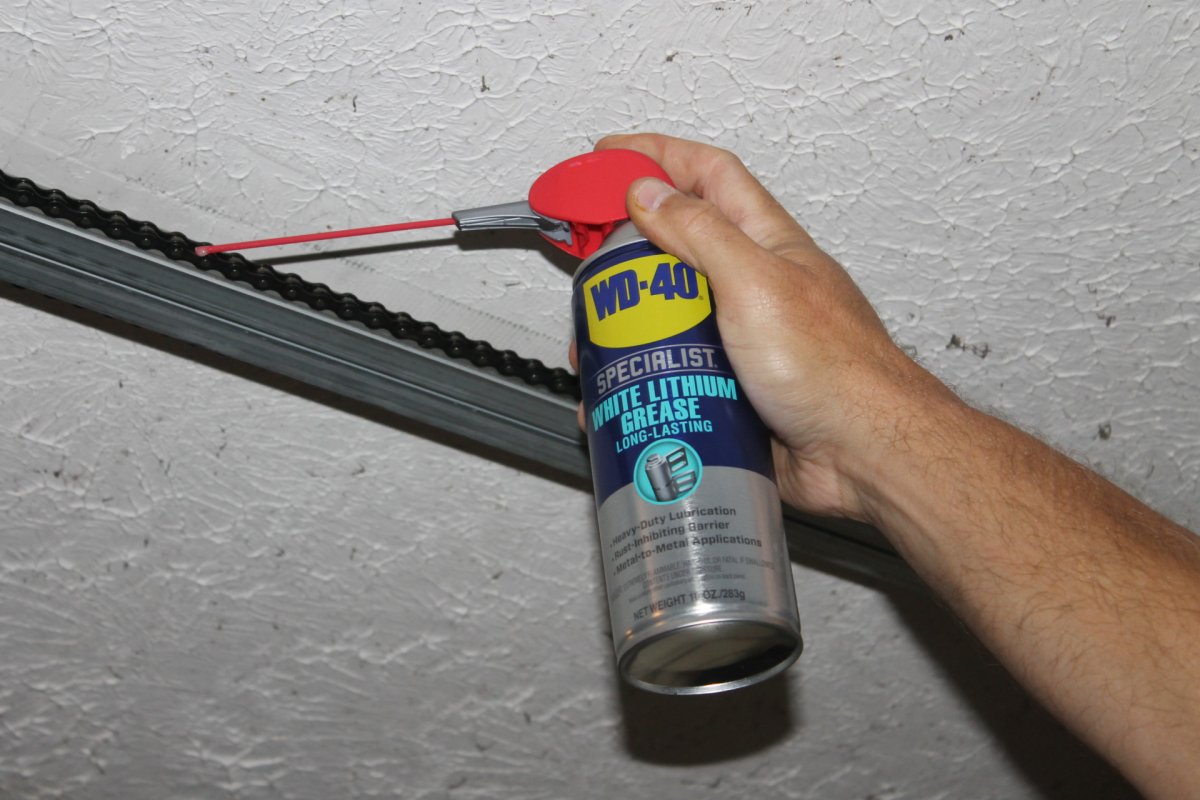
Garage Door Lubricants Comparison
| Product | Base | Form | Size |
| WD-40 Specialist White Lithium Grease Spray | Lithium grease | Spray | 10 ounces |
| 3-In-One Professional Garage Door Lubricant | Silicone | Spray | 11 ounces |
| DuPont Teflon Silicone Lubricant | Silicone | Spray | 10 ounces |
| Gear Hugger Eco-Friendly Multipurpose Lubricant | Plant-based | Spray | 11 ounces |
| Free All Deep Penetrating Oil | Oleic acid and petroleum oil | Spray | 11 ounces |
| Genie Screw Drive Garage Door Opener Lubricant | Lithium grease | Grease/tube | 0.25 ounces per tube (3-pack) |
| Blaster Premium Silicone Garage Door Lubricant | Silicone | Spray | 9.3 ounces |
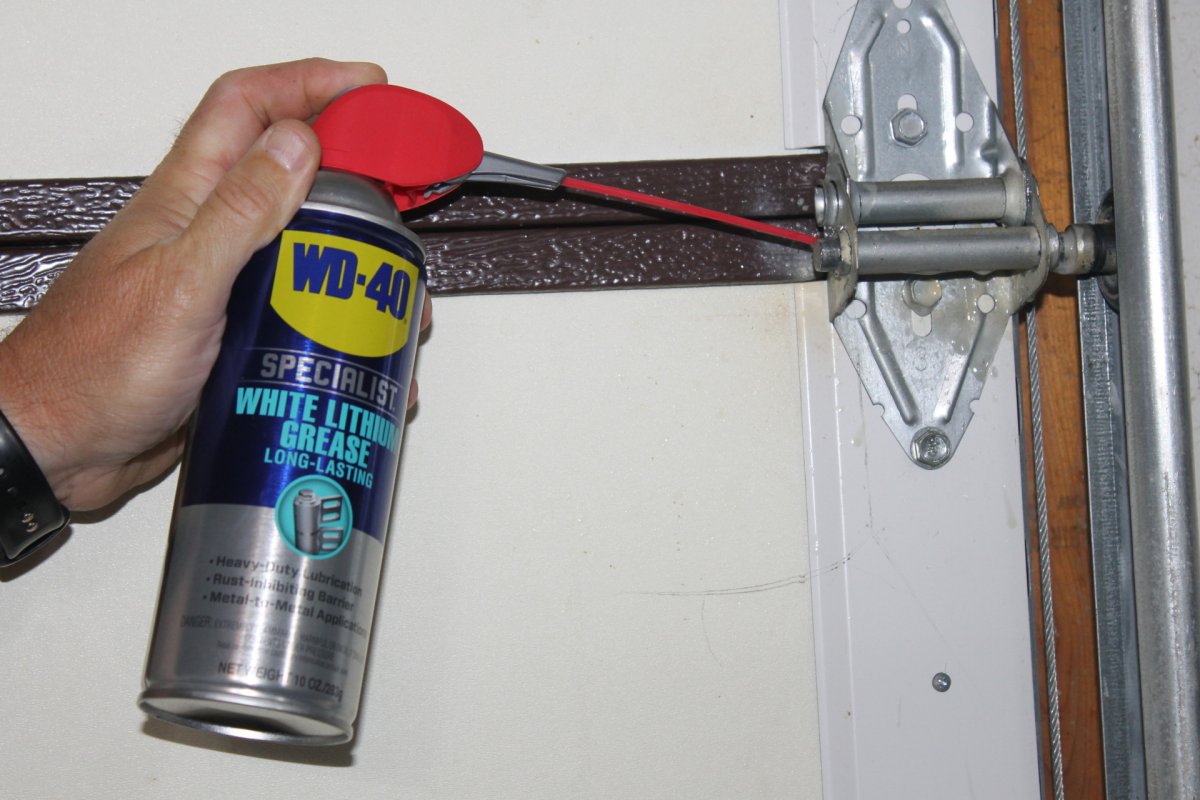
Our Top Picks
We’ve put the following seven garage door lubricants through a series of hands-on tests. These products can help maintain and/or fix your garage door with ease.
Best Overall
WD-40 Specialist White Lithium Grease Spray
Photo: Amazon
What We Like
- 2 spray patterns for customizable application (stream/spray)
- Special barrier protects against corrosion
- Works on all metal-to-metal applications
- Effective in hot and cold temperatures
What We Don’t Like
- Grease coating may attract dirt and dust
Product Specs
-
Base:
Lithium grease -
Form:
Spray -
Size:
10 ounces
Our Ratings
| Application | 4.5/5 | Effectiveness | 4.8/5 | Value | 5/5 |
WD-40 Specialist White Lithium Grease is a powerhouse for lubricating metal-to-metal surfaces, quickly silencing squeaks, and promoting smooth opening and closing. Featuring an integrated Smart Straw, it offers two spray patterns: Users can leave the straw down for a wide spray or flip it up for a more precise application, such as when lubricating small components like garage door hinges. In addition to lubricating, it also leaves a protective coating to prevent rust and corrosion.
During testing, we found that the WD-40 garage door lubricant provided excellent spray control. The integrated Smart Straw prevented overspray, allowing us to avoid wasting excess product. We used it to lube up our garage door chains, rails, and hinges, and also tried it on a squeaky truck door hinge with great success.
WD-40 lithium grease spray is effective in all weather conditions and safe for use in temperatures ranging from 0 to 300 degrees Fahrenheit. However, since it’s recommended only for metal-to-metal applications, avoid using it on plastic or rubber, as it may cause damage. Also, because it leaves a thicker grease coating, dust and dirt may accumulate over time.
What our tester says:“The WD-40 Specialist White Lithium Grease instantly quieted my squeaky garage door hinges. It was easy to apply thanks to the built-in Smart Straw, which let me coat my garage door components with precision.”—Katie Barton, Product Reviews tester and writer
Get the WD-40 garage door lubricant atAmazon,Tractor Supply Co.,The Home Depot, orWalmart.
Best Bang For The Buck
Photo: Amazon
What We Like
- Lubricates while protecting against rust and corrosion
- Built-in straw allows for precise application
- Minimizes dust accumulation
- Doesn’t leave a messy residue
What We Don’t Like
- Has a stronger odor than some other options
- Not multi-use; only intended for garage door parts
Product Specs
-
Base:
Silicone -
Form:
Spray -
Size:
9.3 ounces
Our Ratings
| Application | 4/5 | Effectiveness | 5/5 | Value | 5/5 |
If you’re looking for a lubricant that can lubricate and protect garage door components at the same time, it’s worth checking out the Professional Garage Door Lubricant from 3-In-One. This silicone-based spray reduces friction while also protecting metal from moisture and weather fluctuations. It also features a quick-drying formula that helps prevent messes often attributed to spray cans. The formula can even help reduce future dust accumulation.
The 3-In-One can has two options for application. For deep, hard-to-reach crevices, such as hinges and chains, it features a flexible straw for concentrating the spray. For rails, the straw flips down, exposing a wide-spray nozzle that can cover a larger area. We liked being able to flip back and forth between these two as we coated different areas of our garage door. The spray came out easily and plentifully, although we did notice a bit of overspray with the wide nozzle. The only other downside was a slightly pungent odor after application. Fortunately, this dissipated quickly.
Overall, this affordably priced garage door lubricant was easy to use, effective, and we appreciated its protective formula. It only narrowly missed earning the top spot in our lineup.
What our tester says: “The 3-In-One garage door lubricant was one of my favorites. Although there was a bit of overspray when using it, I found it easy to apply, and I like that it not only lubricates but also prevents future rust and corrosion .”—Katie Barton, Product Reviews tester and writer
Get the 3-In-One garage door lubricant atAmazon,Lowe’s,The Home Depot, orWalmart.
Honorable Mention
Photo: Amazon
What We Like
- Can be used on all garage door components
- Safe for metal, rubber, plastic, leather, and more
- Lubricates and helps prevent rust and corrosion
- Adds a protective waterproof coating
What We Don’t Like
- Doesn’t have a built-in straw for application
- Higher priced than competitors
Product Specs
-
Base:
Silicone -
Form:
Spray -
Size:
10 ounces
Our Ratings
| Application | 4.5/5 | Effectiveness | 5/5 | Value | 4.5/5 |
DuPont’s Teflon Silicone Lubricant is certainly worth a look if you need a product that can lubricate and protect several materials with a single can. This formula works with metal, rubber, vinyl, leather, and wood. It works just as well for garage doors as it does on fitness equipment, bikes, and sewing machines. It’s also suitable for use as a garage door wheel lubricant. The design of this aerosol canister makes it easy to spray rails. It’s ideal for damp or wet garages and barns, as the silicone Teflon fluoropolymer helps displace water and keeps it from corroding or damaging the garage door’s components and hardware.
The DuPont silicone-based lubricant for garage doors features a standard spray nozzle for a wide spray application, but it also includes a straw that can be inserted into the nozzle for a more precise application. We toggled between the two, using the standard nozzle on the rails of our garage doors and the straw applicator for the hinges. The product was easy to use and coated well with fairly minimal drippage. We appreciate that this lube works on various types of materials, and we plan to use it on our exercise equipment as well. The biggest downside? It’s more expensive than some of our other top picks.
Get the DuPont garage door lubricant atAmazon,Ace Hardware, andWalmart.
Best Eco-Friendly
Photo: Amazon
What We Like
- Features an eco-friendly plant-based formula
- Works on all types of moving parts
- No harsh fumes
- Built-in straw for precision control
What We Don’t Like
- Runny formula; lots of drippage
- More expensive than many other lubricants
Product Specs
-
Base:
Plant-based -
Form:
Spray -
Size:
11 ounces
Our Ratings
| Application | 4/5 | Effectiveness | 4.5/5 | Value | 3.8/5 |
Users seeking to avoid the toxic chemicals and noxious fumes associated with many traditional lubricating sprays will want to consider Gear Hugger’s multipurpose lubricant. Featuring a plant-based formula that’s USDA Certified 96% Bio-Based, this non-toxic spray can be used on a wide range of moving parts, including noisy garage doors. Because it includes no petroleum, VOCs, or PTFEs, it’s safe to use around kids and pets. Like many of our favorite garage door lubricant sprays, it features a two-way nozzle, allowing for a wide spray pattern or more precise control with its built-in straw.
In our testing, we used the Gear Hugger lubricant to coat all metal parts on one of our garage doors, including hinges, chains, and rails. While it reduced friction, we immediately noticed that the formula was runnier than the others we tested. The overspray wasn’t excessive, but the drippage was the most of any product we tried, leaving our garage floors splotched in lubricant after application. We also noticed that the formula was a little sticky.
Although using this product did require minor cleanup on our part, there’s no denying that it worked well as a lubricant. We also appreciated the multi-purpose formula, which can be used on bikes, exercise equipment, and more, without worrying about harsh fumes.
Get the Gear Hugger garage door lubricant atAmazon,The Home Depot, orWalmart (8 ounces).
Best For Rusty Doors
Photo: Amazon
What We Like
- Lubricates parts and dissolves rust
- Works on a wide range of rusted metals
- Won’t ruin plastic or paint
What We Don’t Like
- Somewhat messy; a lot of overspray
Product Specs
-
Base:
Oleic acid and petroleum oil -
Form:
Spray -
Size:
11 ounces
Our Ratings
| Application | 3.5/5 | Effectiveness | 5/5 | Value | 4/5 |
If your garage door has seen better days, you might need to take care of some of its other issues before lubricating it. Free All Rust Eater Penetrating Oil takes this two-step process and streamlines it into one. This penetrating oil not only lubricates but also removes rust and deposits, loosening stuck parts with ease.
The Free All Rust Eater uses an oil-based formula consisting of 35 percent rust-seeking chemicals, 30 percent rust-eating chemicals, and 35 percent lubricant. The result is a silicone- and lithium-free lubricant that refreshes and protects garage door components. It comes with a removable straw for concentrating its spray, but it also works well for tracks and rails with its standard spray nozzle.
The Free All deep-penetrating oil did a fantastic job of instantly eliminating squeaks and helping our garage doors operate more smoothly and quietly. However, whether using the straw or spraying directly from the nozzle, there was quite a bit of overspray and drippage. A significant amount of this product is released at once, resulting in a slightly messier application than other lubricants in our lineup. Still, for rusty garage door components, Free All Rust Eater can’t be beat.
Get Free All garage door lubricant atAmazon orWalmart.
Best Screw Drive
Photo: Amazon
What We Like
- Preportioned tubes for easy application
- No harsh fumes
- Paste-like consistency is easy to apply
What We Don’t Like
- Small quantity doesn’t go far
- For screw-drive garage door openers only
Product Specs
-
Base:
Lithium grease -
Form:
Grease/tube -
Size:
0.25 ounces per tube (3-pack)
Our Ratings
| Application | 4/5 | Effectiveness | 4.5/5 | Value | 3.8/5 |
This lubricant from Genie comes in a convenient three-pack of lithium grease tubes designed specifically for screw-drive garage door openers. Applying this grease once per year is recommended to enhance garage door operation. Users are instructed to apply the lubricant on their screw drive rail with 1-inch dabs on three intervals along the rail.
We liked the paste-like consistency of this lubricant—it squeezed out of the tube easily after cutting it open and was simple to apply. Unlike spray lubricant, there were no drips and almost no odors, which is a big plus in our book. The biggest drawback was the limited quantity in each tube, making it necessary to apply the product carefully to make sure we had enough.
If you have a Genie (or other brand) of screw-drive opener, this three-pack offers an easy way to keep the system operating smoothly. Just note that it’s only intended for screw-drive openers, so skip this if you have a chain drive or are looking to grease squeaky hinges.
Get the Genie garage door lubricant atAmazon orAce Hardware.
Also Consider
Blaster Premium Silicone Garage Door Lubricant
Photo: Amazon
What We Like
- Reduces garage door friction and stops squeaks
- Tack-free film doesn’t attract dust
- Also suitable for window tracks, cables, and more
What We Don’t Like
- No built-in straw
- Nozzle was a bit stiff
Product Specs
-
Base:
Silicone -
Form:
Spray -
Size:
9.3 ounces
Our Ratings
| Application | 4/5 | Effectiveness | 4.5/5 | Value | 5/5 |
This easy-to-use pick from Blaster is a high-quality silicone lubricant with a Teflon formula. The resulting greasy texture requires no rubbing into small metal parts in the garage door. Specially formulated for quiet operation, this lube easily penetrates gears and hinges with its thick coating and the spray can comes with a detachable straw. Additionally, you can use it in the colder months without worrying about it freezing, and it repels dust and debris that may accumulate in your garage.
Blaster is a brand we use often, and many of its penetrating oils and lubricants already line our garage shelves, so we were excited to test its garage door lubricant. Unlike some of its competitors, the Blaster garage door spray lubricant doesn’t come with an integrated straw. Instead, we were able to spray directly from the nozzle or attach the included straw for more precise control. While we found the straw a tad difficult to attach and the nozzle a bit stiffer than other products we tried, the lube itself did a wonderful job of coating our garage door hinges with minimal overspray and dripping.
Get the Blaster garage door lubricant atAmazon,Lowe’s,Tractor Supply Co.,The Home Depot, orWalmart.
Jump To Our Top Picks
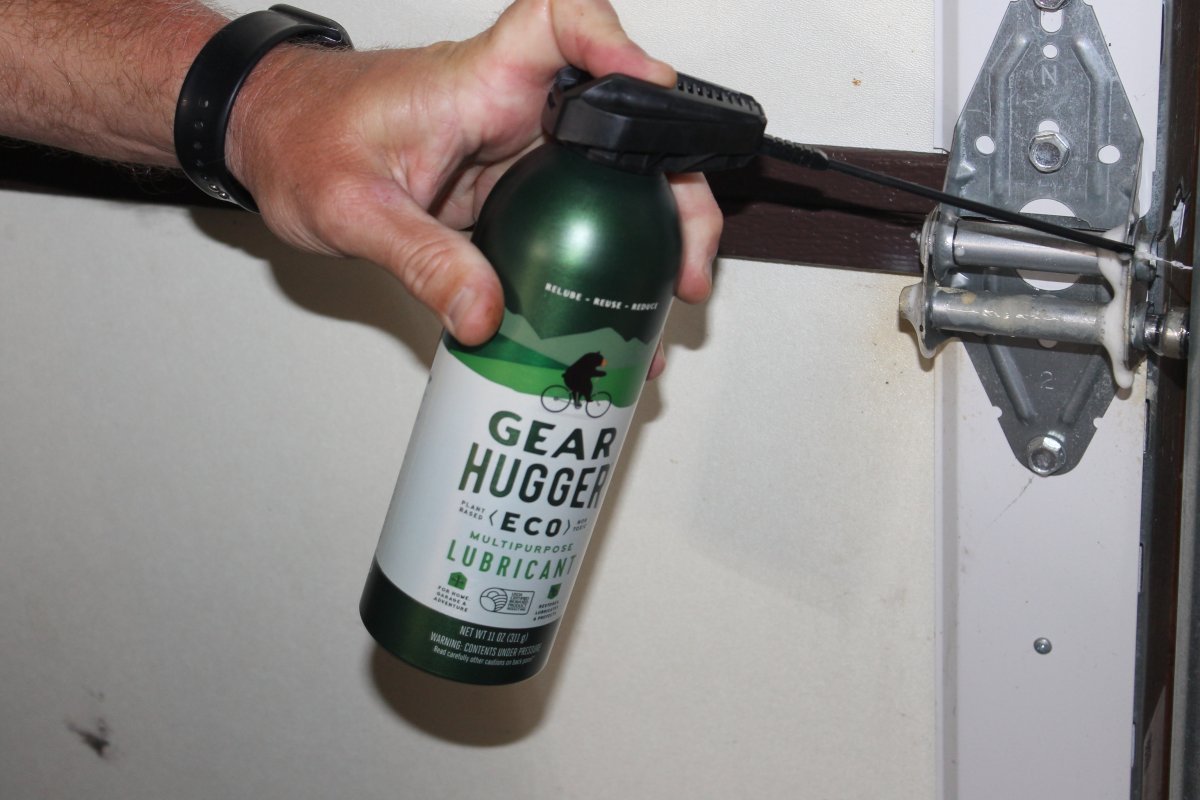
How We Tested the Best Garage Door Lubricants
| Products tested | 7 |
| Time spent testing | 1 month |
| Tests performed | 3 |
| Price range | $8 to $15 |
We researched the most sought-after garage door lubricants in their respective categories and discovered that the best options are determined by their ingredients, form, quantity, compatibility with multiple surfaces, and other special features included by the top brands. While searching for the best garage door lubricants available, the spray options proved to be among the most popular due to their ease of use and effectiveness. And though grease and paste formulas are not as popular, they are water-resistant and heavy-duty. To provide ample options and satisfy a range of preferences, we selected seven silicone, lithium grease, and oil-based formulas that work on a variety of materials and surfaces. We then set to testing them.
We spent a month testing each product on all applicable surfaces on our garage doors, evaluating them for ease of use, effectiveness, and value. Our results were recorded in a standardized rubric, where we rated products from 1 to 5 based on how they performed. At the end of testing, we tallied the results and gave each lubricant an award based on the area in which it excelled.
| Product | Application | Effectiveness | Value |
| WD-40 Specialist White Lithium Grease Spray | 4.5/5 | 4.8/5 | 5/5 |
| 3-In-One Professional Garage Door Lubricant | 4/5 | 5/5 | 5/5 |
| DuPont Teflon Silicone Lubricant | 4.5/5 | 5/5 | 4.5/5 |
| Gear Hugger Eco-Friendly Multipurpose Lubricant | 4/5 | 4.5/5 | 3.8/5 |
| Free All Deep Penetrating Oil | 3.5/5 | 5/5 | 4/5 |
| Genie Screw Drive Garage Door Opener Lubricant | 4/5 | 4.5/5 | 3.8/5 |
| Blaster Premium Silicone Garage Door Lubricant | 4/5 | 4.5/5 | 5/5 |
What to Consider When Choosing a Garage Door Lubricant
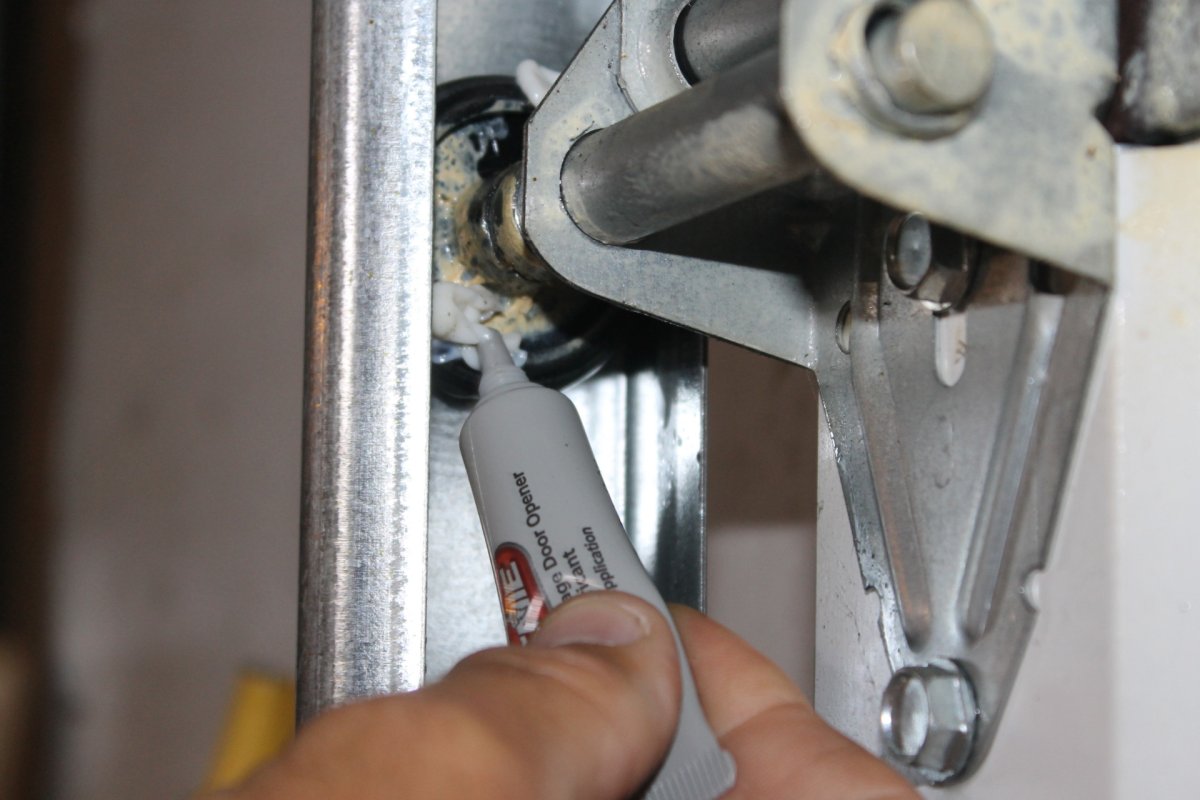
Lubricating garage doors regularly can prevent serious garage door repair costs. But before you start spraying the garage door lubricant you found under your kitchen sink, there are a few things you should know. Some lubricants perform poorly in high or low temperatures, and most can make a drippy, sloppy mess. It’s best to do a little research to ensure you choose the best garage door lubricant for your situation.
Below are some of the most important things to consider when shopping for a garage door lubricant. Keep them in mind while shopping to make sure the process goes as smoothly as possible.
Lubricating Base
While there are quite a few products billed as lubricants, two types are most effective for garage door applications: silicone and lithium. They both work very well, but one might be better for a particular application than the other, and the winning recipe may be a combination of both types applied on different components.
Keep in mind that while most garage door parts are metal, there are other materials used in the garage door operating components. Many rollers are plastic or nylon, and seals are usually rubber-based. Both of the main types of lubricant bases mentioned below are safe for any of these materials.
- Silicone-based lubricantsare long-lasting and provide moisture resistance. These lubricants also do a good job of working their way into tight hinges, coiled springs, and other hard-to-penetrate areas. They’re extremely weather-resistant, so they’re often the best choice for areas with cold winters and hot summers.
- Lithium-based lubricantsdo a great job of reducing metal-on-metal friction and wear. These lubricants are more likely to stay on the surface rather than soaking into a part. This makes them incredibly good for lubricating garage door rollers, rails and other friction points. Lithium also does a good job of being weather-resistant, but it doesn’t provide much waterproofing.
Though not quite as common, oleic acid can also be found as a base in some garage door lubricants. While it can help quiet squeaky components and reduce friction, it breaks down more quickly than synthetic bases. To combat this, manufacturers may combine it with other ingredients to boost its longevity and performance.
There are also other types of oil-based lubricants, but if the lubricant isn’t specially formulated for use on garage doors, it may not be the most reliable option. These can dissipate too quickly or become less effective in extreme temperatures. They also tend to drip or “sling” from rotating parts.
Form
Like all lubricants, garage door lubricants come in a variety of forms. The two most common types to consider for your garage door are grease and spray.
- Grease can be messy. It usually comes in cans or tubes, and it requires you to smear it onto the surface. However, it’s long-lasting and creates a film that all but eliminates friction. It can heat up and wear away over time, but it also can be the ideal choice for garage door rails and tracks. Keep in mind that grease comes in many forms, but lithium- or silicone-based greases do the best job of resisting harsh weather.
- Sprays are far easier to apply than grease. They’re usually silicone-based, but it’s not hard to find lithium-based sprays. They also do a better job of soaking into tiny nooks and crevices, providing protection in areas that grease can’t reach. They do wear off or dry out a bit sooner and require more frequent reapplication, which is every few months or so. However, they’re much easier to reapply than grease. While they might not last as long on a rail or track, the ability to respray so quickly is appealing.
Intended Use
A can of door lubricant is one thing every great garage needs sitting on its shelf. But before purchasing a product, consider how you plan to use it. Some products excel at specific aspects of garage door lubrication while falling short in other ways. As such, the ideal garage door lubrication plan could involve using two different products.
If you’re planning on treating your wheels and hinges, a spray-based lubricant may be your best option. You’ll be able to aim the product right where it needs to go, allowing it to soak in with ease.
If you’re looking to protect your rails, you might consider a grease-based product. While it’s messy, grease lasts a long time and might be the best choice in these applications. Keeping a rag on hand to wipe rogue grease and to use as a background for spraying will help reduce potential messes.
Longevity
Longevity can be a tricky proposition. While a lubricant needs to last as long as possible, many manufacturers recommend using their products every month. Monthly treatment will certainly help the garage door last as long as possible, but it might not be feasible or even necessary.
The trick is to get into a routine in which you’re greasing or oiling your garage door before it needs it, but not so often that your door is dripping or spraying excess lubricant when the door opens and closes. This interval will depend on many factors, including the door’s condition, the temperature and weather fluctuations where you live, and how often you use your garage door. Some lubricants have the potential to last for up to a year, though this will depend on your specific garage door and local climate.
If your garage door won’t close or isn’t working properly, it’s important to identify the cause of the issue before determining your lubrication interval.
Application
The way you apply your lubricant will largely determine which product is right for you. Spray lubricants for door hinges and rails are obviously the easiest to apply in most situations. They come with long, reusable straws that help pinpoint the spray into a tight spot, but you can also remove the straw to quickly cover rails.
Greases can be a pain, but their ability to protect and lubricate might make them worth the effort. Applying them can require a brush, a gloved finger, or a toothpaste-like squeeze tube. It’s hard to get these pastes and greases into tight nooks, but you can make an effort with a fine-tipped paintbrush or toothbrush. Just be sure to dedicate these tools to grease-only uses, as they’d be rather unsuitable for their intended uses after greasing your garage door.
Tips for Using Your Garage Door Lubricant
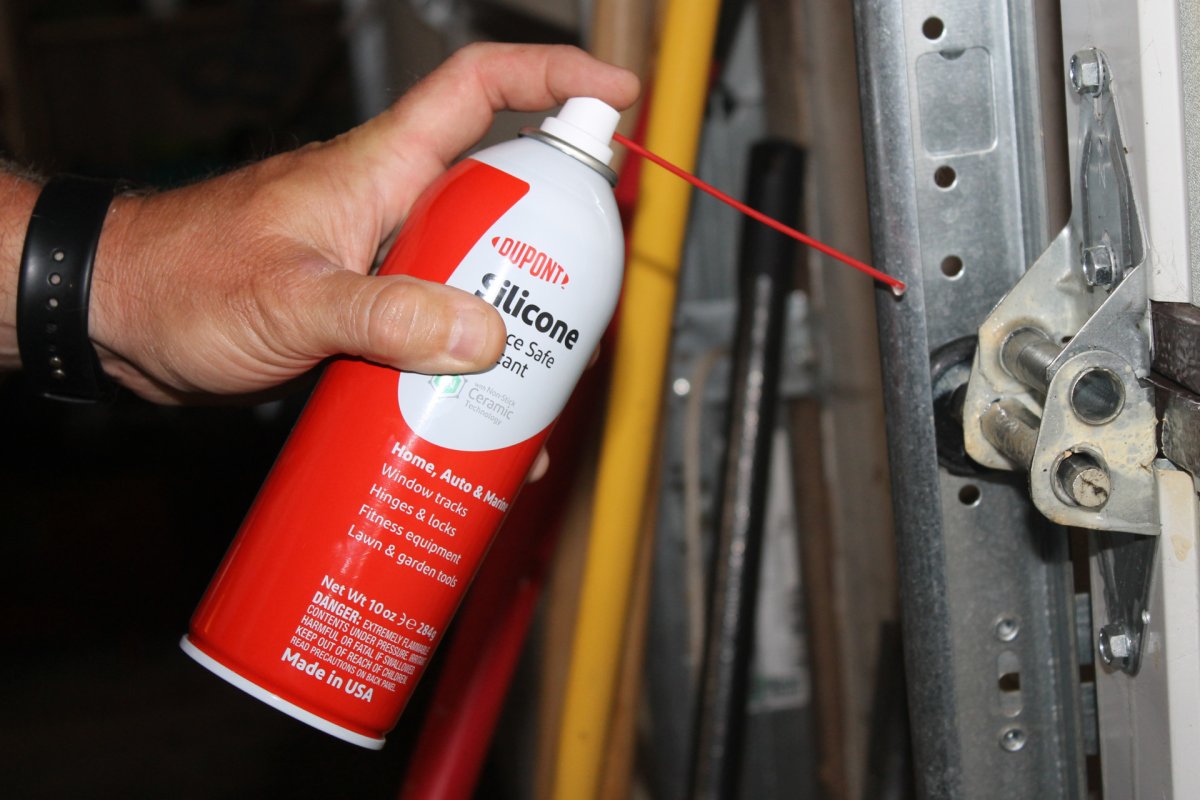
You may think that applying garage door lube is easy, but there are a few things to be aware of before you start spraying, smoothing, or brushing lube on a garage door’s moving parts. Firstly, always lubricate the garage door’s moving parts with the garage door completely closed to ensure you have clear access to all of the metal components. To be on the safe side, you should also disconnect the power to the garage door to avoid unwanted opening or moving parts.
Before lubricating the garage door, clean any dust and debris on the garage door springs, chains, tracks, bearing plates, and rails with a damp rag or vacuum to keep the metal components running smoothly. Finally, after applying the lubricant to the chains and rails, be sure to spray any hinges, rollers, or locks that may be on the garage door itself. Lubricating these smaller parts reduces friction overall.
- Always ensure that all dust and debris are removed from the garage door, tracks, rails, rollers, bearing plates, and other parts before lubricating.
- Do not apply too much lubricant to the internal workings as only a light coat is required.
- After you are done lubricating, open and close the garage door to ensure you applied enough product and that there is no rattling or creaking during operation.
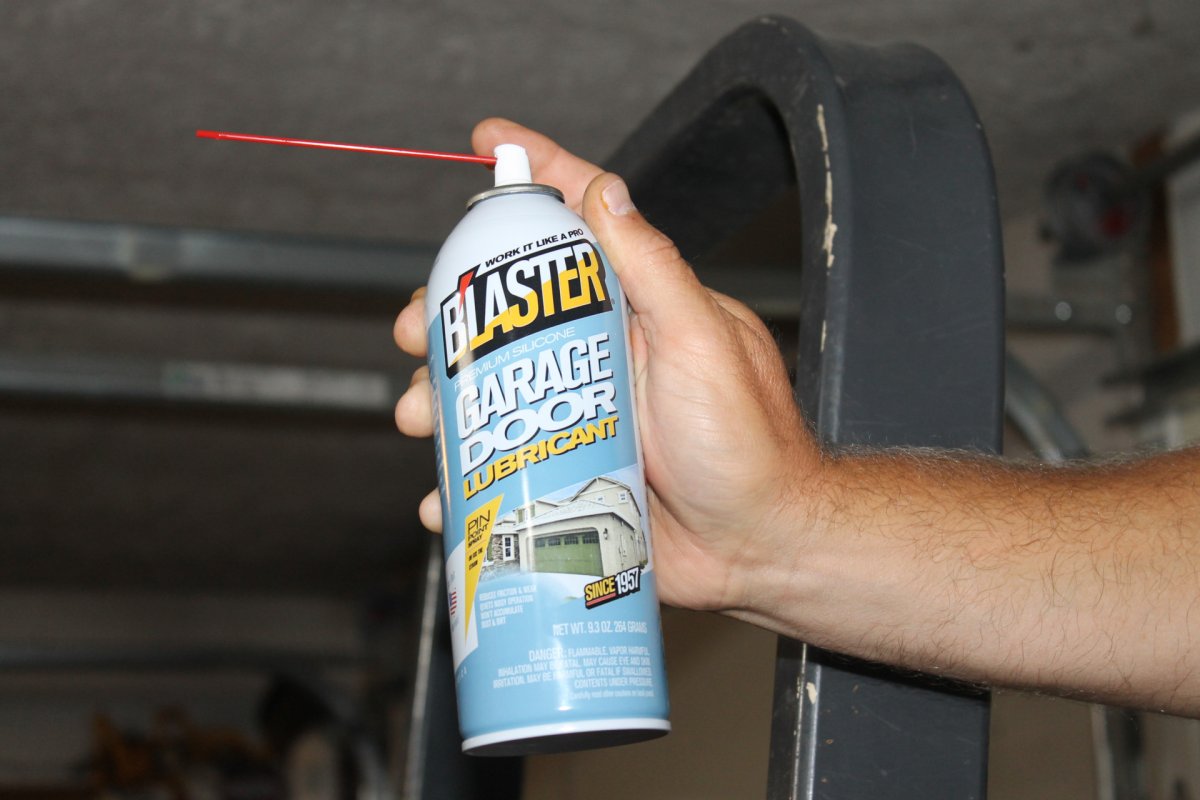
FAQs
Now that you know more about the best garage door lubricants, you still might have a few questions about how they work and how you’re supposed to use them. The following is a collection of some of the most frequently asked questions about garage door lubricants.
Standard WD-40 does a great job of removing rust, but it doesn’t do much to provide long-lasting lubrication. WD-40 Specialist White Lithium Grease Spray, on the other hand, provides a thick grease coating to keep garage door components lubricated for longer.
Silicone is an excellent spray lube for garage doors. It reduces friction, provides moisture protection, and resists extreme temperature changes.
To lubricate a garage door, first clean the components so they are free of dust and grime, then apply the chosen product to the hinges, the rollers (which will lubricate the tracks—don’t lubricate the tracks directly), the door spring, and any gears or chains connected to the garage door opener mechanism.
The answer to this question depends on many factors. While each lubricant product has its own specific application guidelines, lubing a garage door every few months is usually enough for most types. Even the best garage door will need to be lubricated from time to time. But if your garage door is in rough shape or experiences frequent and severe temperature fluctuations, you might consider spraying monthly. If your garage door won’t open or close, it may not be a lubricant issue; you may need to investigate other possible issues before reaching for a lubricant.
No, you should not lubricate garage door tracks. Instead, clean the tracks and lubricate the rollers so that they glide smoothly along the tracks.
A quality can of garage door lubricant is often under $10 and typically contains enough formula to lubricate multiple doors.
Maintain the garage door by inspecting it at least twice a year for signs of damage or broken parts. Clean the garage door at least once per year and apply lubricant regularly to ensure smooth operation. Regular maintenance can prolong the life of your garage door, preventing you from prematurely incurring the costs of a garage door replacement.
Meet the Tester
Katie Barton is a writer and product tester with 10 years of experience in the home improvement field. She maintains her own three-car garage and keeps the doors running smoothly with a white lithium grease spray.
Additional research provided by Tom Scalisi
The post These High-Performing Garage Door Lubricants Stop Squeaks and Rust appeared first on Bob Vila.
